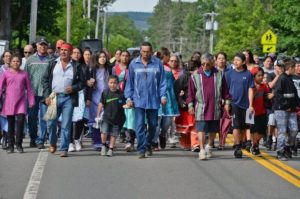
As school districts around the state settle in for the summer, things are anything but settled on the Onondaga Nation, where parents took our children out of the Onondaga Nation School for the last two weeks of the year to protest the refusal once again by the LaFayette Central School District to name an indigenous principal for the all-indigenous school.
The Onondaga Nation School sits on Onondaga land, but is overseen by the LaFayette district under an arrangement with the state Education Department. Two other indigenous schools in New York have similar arrangements with non-indigenous school boards.
We are hamstrung in this relationship in part because as citizens of a sovereign nation, recognized by the 1794 Treaty of Canandaigua, signed for the United States by George Washington, we do not vote in local, state or federal elections — including for school board. So we find ourselves subject to a non-indigenous school board which takes state money for our school but has failed to accept that we should have a central role in its governance.
Congressional findings for the Indian Self-Determination and Education Assistance Act expressly state that “[parental and community control of the educational process is of crucial importance to the Indian people” and that indigenous people have the right to “an education in their own culture and provided in their own language.”
